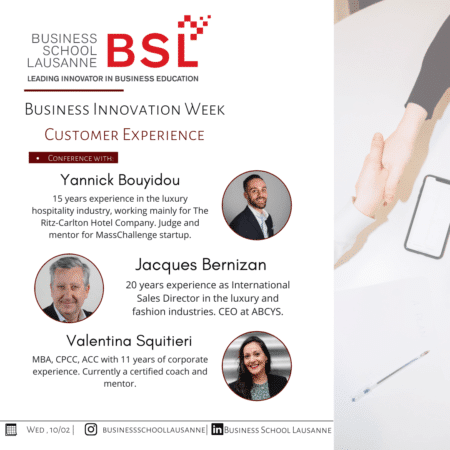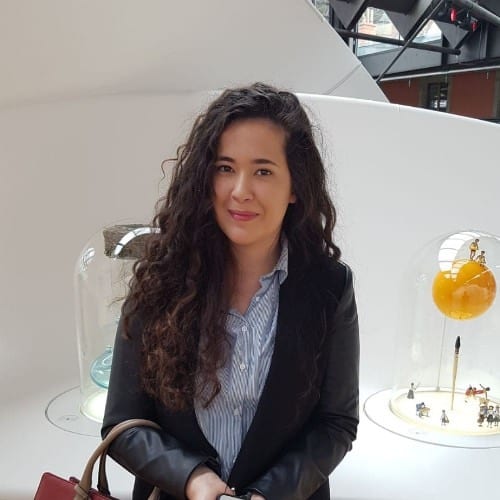
The importance of customer experience in today’s world!
Lately, competition between companies has become more fierce than ever before and the customer remains the core of any decision-making process. Companies are putting increased amounts of effort and resources to provide unique customer experiences, which can sometimes be hard to achieve.
We were honored to welcome Mr. Yannick Bouyidou for a fascinating exchange about customer experience. Yannick graduated with honors in Hospitality Management from the Erasmus University of Brussels and has nearly 15 years of experience in the luxury hospitality industry, working mainly for The Ritz-Carlton Hotel Company in Africa, the Caribbean, Europe, North America, and the Middle East. Prior taking over Rooms Executive at the Ritz-Carlton in San Francisco, he started as a bellboy in Spain, growing into various leadership positions responsible for improving the customer experience, nurturing employee engagement, and driving financial performance. Additionally, he also led a quality improvement project targeted at optimizing the customer journey for various hotels in America region. Yannick is currently an MBA candidate at BSL – guest speaker – and founder of BY Excellence, which assists companies from diverse industries in leveraging their customer experience and customer journey to create a sustainable competitive advantage in this digital era. Finally, he serves as a judge and a mentor for MassChallenge, a leader in helping startups across Europe grow their businesses, accelerating nearly 400 startups.
What is customer experience and why is it important?
Before talking about customer experience, Yannick highlighted the difference between customer experience and customer service. We can think about customer service as “one piece” of the customer experience which represents the entire journey of a customer. He shared with us some impressive data that supports the importance of customer experience. For instance, one third of customers would consider leaving a company, or no longer using a product or service, after only one poor experience (2017, American Express). Moreover, only 1 in 26 unhappy customers complain, which means that 25 will purely leave and switch for another competitor without giving any chance to repair the issue they may have faced (2017, Salesforce).
After establishing this base, Yannick asked us to share any positive and negative experiences we have been through as a customer. We could emphasize from that exchange the importance of trust. Losing customer trust will break a relationship with the company and recovering it is almost impossible.
How to leverage customer experience to gain a sustainable competitive advantage?
After explaining the importance of customer experience, Yannick shared with us how to leverage customer experience to gain a sustainable competitive advantage.
First, it is really important to understand that quality is defined by the customer. This idea brings us to consider each customer as unique and to understand their needs and wants. By understanding their customers, a company can personalize quality to meet expectations. A company should genuinely care about their customers to make them feel valued and important. It is important to take into account their well-being, comfort, satisfaction and so more.
This being said, it is difficult for a business to provide a defect-free experience. This is due to the fact that the experience is based on the client perception. Therefore, it is important to take care customers’ feedback and pay deep attention to them. Yannick brought out the importance of empathy and fixing the relationship as they are key in case of any defect. A company should show empathy and an understanding of a problem and fix it. After fixing the immediate problem, it is important now to fix the broken relationship.
Customers’ expectations change. A company needs to make sure that its foundation is well established. After having acquired a deep understanding of the customer, a company should attempt to anticipate their needs and wishes to be able to exceed their expectations.
In addition, to be efficient in terms of customer experience, a company should embed this as part of its corporate culture. Creating a customer experience should become a purpose, not a task that should be done. A company should also develop a culture of trust and respect within the company itself. Finally, it should empower its employees through trust. Yannick emphasized the idea: “you cannot have engaged customers if you do not have an engaged workforce!”
After discussing customer experience, Yannick gave us steps that we can follow to map the customer journey:
- Identify the customer journey phases: Describe the experience in each phase of the journey.
- Identify customer personas: Know who the customers are. Identifying the personas will help to personalize the customer journey for each persona.
- Map their individual journey across all channel and touch points.
- Map their emotional journey and identify pain & gain points.
- Create a strategy on maximizing the gain points, improving the pain points, personalizing each journey to its persona’s profile and anticipating customer needs. The idea is to have an omnichannel experience that leads to retention and loyalty rather than short term profitability!
We were pleased to have Yannick share with us his experience and knowledge about the importance of customer experience and we were able to grasp a deeper understanding of this topic, with the hopes to use his tips to enhance customer experience as future young professionals. All the students were very grateful to him and want more interventions of this type.

Written by Hiba Elketroussi
Master’s Candidate & Student Council Member
at Business School Lausanne
